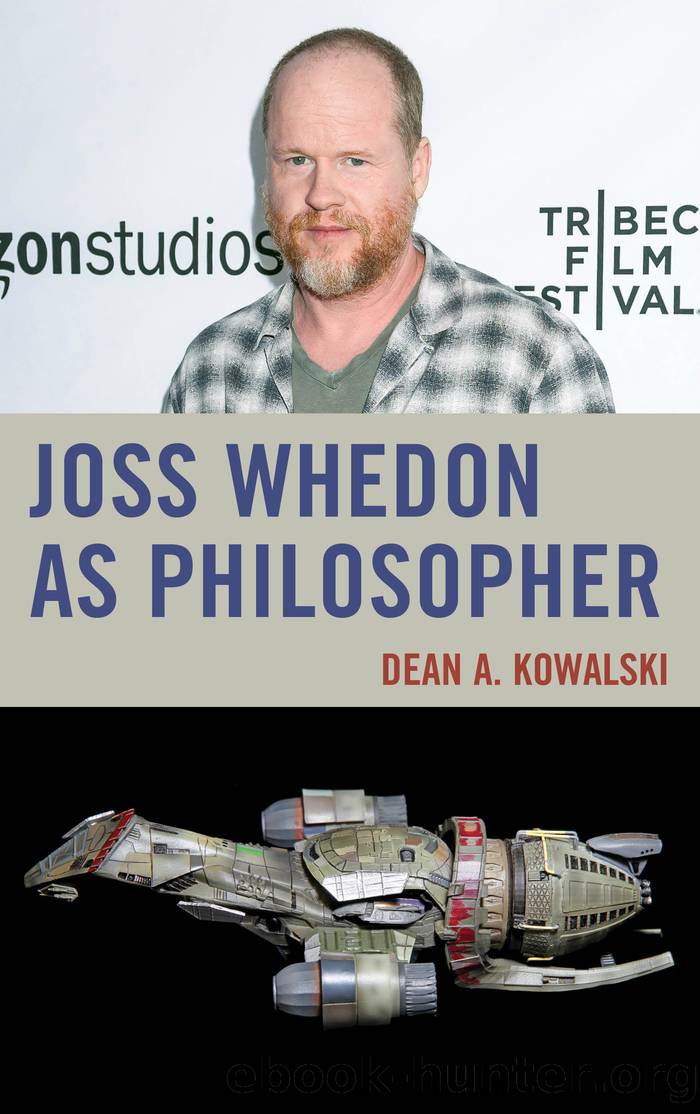Joss Whedon As Philosopher by Kowalski Dean;

Author:Kowalski, Dean;
Language: eng
Format: epub
Tags: undefined
Publisher: Lexington Books/Fortress Academic
Published: 2012-12-15T00:00:00+00:00
Certainly, if Mulhall countenances the life of Socrates as testament to a vision of ethically significant meaningfulness that each of us should carefully consider, then undoubtedly Whedon accomplishes a similar result in his audience via his novel and rich depiction of Angel. Whedonâs tortured vampire with a soul tirelessly strives for redemption as a result of the vile deeds he could not prevent; however, he finds only modicums of atonement by âhelping the helplessâânot for his sake, but (invariably) for its own sake. Whedon intimates that this is an ideal each of us should aspire to. We, too, can make the world less harsh and cruel by living as the world should be, to show it what it can be. Therefore, if Mulhall is correct that filmmakers successfully philosophize via their vivid and gripping fictional depictions of what ultimately matters, then Whedon plays the part of the philosopher via his portrayal of Angel.
Mulhallâs third rejoinder begins by carefully examining human nature. Mulhall believes that human beings are inherently reflective beings, which, he believes, entails that we are inherently philosophical beings. Mulhall elaborates, âWhat distinguishes the philosopher is the persistence and the single-mindedness with which he employs the capacity for self-questioning that informs every aspect of our ordinary existenceâ (144). Just as philosophers are prone to question the basic principles and assumptions in the various disciplinesâaccounting for philosophy of science or philosophy of religion and the likeâMulhall argues that philosophers must be consistent and continually reevaluate the fundamental principles and assumptions of philosophy itself. He further argues that opponents of the film-as-philosophy thesis are invariably guilty of not being sufficiently self-reflective about the nature of philosophy. Preconceived (and invariably a priori) notions of what philosophy is prevents them from fully considering the possibility that a reflective filmmaker is being philosophicalâand thus doing philosophy in his or her own way through the non-standard medium of film. As Mulhall eloquently puts it:
Rather than allowing their experience of particular films to teach them what ethics, art, imagination, emotions and thinking might be, they permit their preconceptions about the nature of ethics, art, imagination, emotions and thinking to dictate what their experience of these phenomena as presented in or activated by particular films might be. And rather than allowing their experience of particular films to teach them what philosophizing might be, they permit their preconceptions about the nature of philosophy to determine what their experience of particular films might be (145).
Download
This site does not store any files on its server. We only index and link to content provided by other sites. Please contact the content providers to delete copyright contents if any and email us, we'll remove relevant links or contents immediately.
How To Write A Damn Good Thriller by James N. Frey(389)
Naked as Nature Intended by Pamela Green(371)
30 Movies to Get You Through the Holidays by Roger Ebert(363)
Bond, James Bond by Brad Gilmore(303)
It's Only a Movie! by Haberski Jr. Raymond J(290)
Chinese films in focus II by Unknown(259)
The Fellowship of the Knits: Lord of the Rings: The Unofficial Knitting Book by Tanis Gray(249)
How To Write A Novel The Easy Way Using The Pulp Fiction Method To Write Better Novels: Writing Skills by Jim Driver(238)
The Greatest Show on Earth by Jerry Pinto(230)
Film Truth; November, 1920 by Anonymous(218)
Smartphone Cinema: Making Great Films with Your Mobile Phone by Bart Weiss(216)
The Garden in the Machine by Unknown(211)
The Reel Truth by Reed Martin(205)
Charles McGraw by Alan K. Rode(202)
Jurassic Park and Philosophy by Watkins Jessica Michaud Nicolas(201)
Thomas Mann and Friedrich Nietzsche: Eroticism, Death, Music, and Laughter by Caroline Joan Picart(201)
Jafar Panahi: Interviews by Unknown(197)
The Japanese Cinema Book by Hideaki Fujiki & Alastair Phillips(196)
Euro-Visions: Europe in Contemporary Cinema by Mariana Liz(194)
